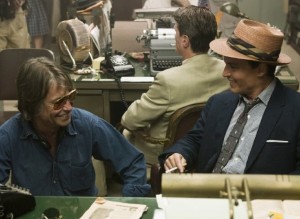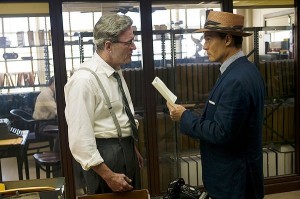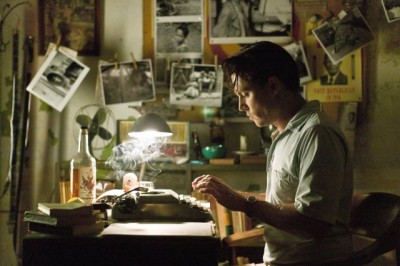
I wanted to like Bruce Robinson’s The Rum Diary more than I do, although I think I’ll actually like it more than I currently think I do. In other words, I think the more this curious movie sits with me, the more I will appreciate it. The movie isn’t curious in any overt sense. It’s not hard to follow, structurally challenging or complex in any signficant way. It’s certainly more user-friendly than Johnny Depp’s earlier foray into the world of Hunter S. Thompson, the Terry Gilliam-directed Fear and Loathing in Las Vegas (1998).
No, its oddness is rooted in the material itself. The book on which it’s based is an early work by Thompson—a work that Depp came across and convinced the author to have published nearly 40 years after its writing. It purports to tell the story of Paul Kemp (Depp)—a journalist working on a drinking problem—who lands a job at a newspaper in San Juan, Puerto Rico, primarily on the strength of being the only applicant. The story follows his adventures, as well as his attempts at being a crusading reporter in a hotbed of corruption and apathy. Kemp, of course, is a thinly veiled version of Thompson. The film compounds this in its ending credit that uses the names interchangeably. The thing is, Thompson was never hired to work as a newspaper reporter in San Juan, so the story can only be called quasi-autobiographical wish-fulfillment. It’s not that unusual a thing to use as the basis of a novel, but it does make such works factually slippery. It also makes the reason for the film adaptation’s existence vague.

I suspect The Rum Diary exists because Johnny Depp loved Thompson, and felt a deep kinship with him—and because he thought that Bruce Robinson, who’d done two films Depp admired, could bring it to the screen with the same depth he brought to Withail & I in 1987. The idea was that if Robinson could find the sad, stunted humanity within Withnail (Richard E. Grant), he could do the same with Kemp and his peculiar cohorts. And that turns out to be only sort of true. The problem is that when all is said and done—and all the semi-denials are taken out of the way—the “I” character of Marwood (Paul McGann) in Withnail was Bruce Robinson. (McGann is even made to look like him). Robinson had a true insider’s view on Withnail (as much as anyone could) and that time. That’s not true with in Robinson’s take on Kemp/Thompson. It’s also perhaps why the less-defined supporting characters are often more interesting than Kemp.

The story isn’t much, and there’s not much structure to it. Essentially, Kemp—who absurdly describes his drinking as being “on the high end of social”—finds himself churning out an astrology column and Puerto Rico Tourism Board puff pieces, while wanting to do hard-hitting articles that don’t fly with job-security-conscious editor Lotterman (Richard Jenkins). In the meantime, Kemp becomes friends with jaded news photographer Sala (Michael Rispoli, Kick-Ass) and the sometimes-fired, perpetually drunk-and-drugged Hitler aficionado, Moburg (Giovanni Ribisi). He also becomes besotted with Cheanault (Amber Heard), who turns out to be the mistress of crooked land developer Sanderson (Aaron Eckhart), who, for all intents and purposes, runs the island. Sanderson also becomes interested in Kemp, who, as a member of the press, might be useful in helping smooth over a dubious land deal on a nearby island.

What happens is less important—and ultimately, it can almost be said that nothing really does happen—than the often very amusing vignettes and characterizations. Depp is fine as Kemp/Thompson. He has all the mannerisms nailed down, and he does convey the sense of a man who has yet to “find a way to write like myself,” but somehow the characters played by Rispoli and Ribisi were more interesting to me. Their inexplicable obsessions, and the fact that they know (whether they admit it or not) that, unlike Kemp, they’re not going anywhere, gives them a resonance he lacks. Maybe the sad truth is they found their voices some time back and the discovery was less than they expected.
Overall, The Rum Diary misses greatness, but contains elements of greatness of the kind that only comes from filmmakers who are willing to take real chances. That those chances don’t always or completely work is the price you pay. But here, enough of those risks do pay off, and the film is worthwhile even if it’s not what it might have been. Rated R for language, drug use and sexuality.




I wish the biggest problem I had with this movie was the believability of Depp playing a 20 something Kemp. I
You seem to be taking this very personally. Maybe it doesn’t bother me because I don’t care all that much about Thompson, but a film is completely its own beast to me. It’s up to the filmmaker(s) to decide what to do with the material (or to it if one objects strenuously to what’s done). Ultimately, they haven’t done anything to the book — it, as itself, remains unchanged.
I feel like the biggest reason THE COLONEL…aka Depp…made this movie and pushed for it was to keep Hunter fresh out there…and even thought they changed it and made it work for film time…whatever…it will inspire people who have not read his work to do so.At least i hope that happens….We are living in a world of change and people are fed up…Hunter was a voice like no other who walked the line and spoke from his heart..I thought your review was well put. GP STAY GONZO!!!
I don’t know if taking it personally is exactly what I’m doing. I realize that a critics job is to critique the film, not the departures it may have taken from the book, but still I guess I went in expecting to see one thing and got quite another. It’s not like it came with an “inspired by” disclaimer. You may not care about Thompson at all or how his work is represented but perhaps there are other authors you would? Sadly, authors who have sold the film rights to their book and dead ones at that can’t contest the representation, but it is a subjective world we live in after all. Fans of Depp and others who have not read the book may love this film. Anyway not taking it personally just disappointed I guess, yeah that
As another Thompson aficionado, I don’t find the dramatic license taken with the novel offensive at all. Thompson himself didn’t like the work, and only released after cajoling from Depp. I like the book, but it’s hardly canon Thompson.
I haven’t seen the movie yet, but I’ve read the novel several times. Hanke’s description of some of the characters as obsessive aligned with my reading of a similarity between Rum Diary and Catch-22. The characters and scene are somewhat unreal, yet short of outlandish. That early sense of what would later become Gonzo is why I find the Rum Diary engaging.
I feel like the biggest reason THE COLONEL…aka Depp…made this movie and pushed for it was to keep Hunter fresh out there
That very likely is the reason. Regardless of what liberties it takes, it’s still pretty much a love letter to Thompson.
Interestingly, the industry insiders (those folks that figure out why something flopped at the box office) blame the film’s failure on a lack of interest in or even knowledge of Thompson. That may be. The show I attended had a reasonably big audience for Friday at 2:15 p.m., but it was almost entirely made up of people old enough to have a familiarity with Thompson.
You may not care about Thompson at all or how his work is represented but perhaps there are other authors you would?
I can’t think of any and that’s simply because the two media are so different and the book isn’t the film and isn’t going to be. I’m of the Orson Welles’ school of thought that when you make the film of anything, it becomes your film and your right to transform it as you think best. Ideally, I think a film based on anything should reflect both the source and the filmmaker’s reaction to that source.
My general take is that it’s like remakes. It doesn’t matter what they’re like because the original is still there unchanged. It’s like that story about someone saying to William Faulkner that it was a shame what Hollywood had done to his books. Faulkner supposedly said, “What do you mean? They haven’t done anything to the books. They’re right there on the shelf.”
Is it as much fun as the trailer makes it look?
Well stated Mr. Hanke, I can appreciate your appreciation for the craft of cinematic interpretation. However, many of us I believe (though certainly not all), like the idea of seeing a book come to life and when it doesn
Is it as much fun as the trailer makes it look?
I don’t think it really is, no, though there are fun things in it. I don’t think the tone is quite as glib as the trailer suggests.
However, many of us I believe (though certainly not all), like the idea of seeing a book come to life and when it doesn?t match up with the visions we had in our head, then I guess the movie fails for some of us.
Oh, undoubtedly. I am occasionally disappointed by something a film leaves out — be it from a novel or a play — but I try to keep it in the perspective of “it’s not my film” so it’s not my take on the material. Doesn’t mean I agree with the choice. I’ve seen very different adaptations of the same book that each worked in its own way. The two versions of BRIDESHEAD REVISITED come to mind, though, truth to tell, I thought the two hour theatrical film that made more changes to the book was actually more faithful to the book’s ideas and themes than the six-plus hour TV film.
It’s probably a good idea to know — if you can — where your reviewer is coming from, by the way. There are essentially three ways to look at The Rum Diaries — Thompson, Depp, or Robinson. I freely admit — and I think you can tell from the review — that I was more interested in it as a Bruce Robinson film than anything else.
Bit late to the conversation. I like empty theaters so I usually wait for the second week or so if not the DVD.
Haven’t read the book, but wondered if anyone who had can fill me on whether the hallucinogen scene was part of the original work or if it was added to the movie just so people would get the expected HST drug scene.
It just seemed tacked on and did nothing to move the story, even in the context that this is an HST origins tale.
Enjoyed the rest of the movie greatly and thought it held a prescient take on the problem of journalism tiptoeing around stories that involve those people who keep the lights on.